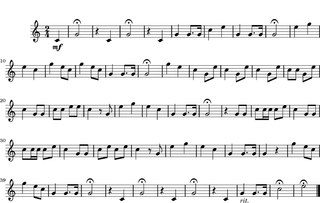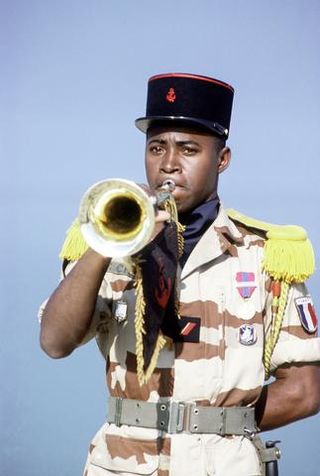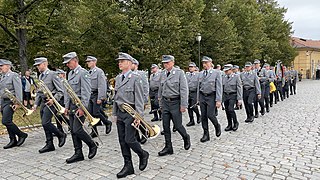"Assembly" is a bugle call that signals troops to assemble at a designated place. [1]
"Assembly" and "Adjutant's Call" are the two bugle calls that make up the "formation" category of bugle call. [2]
"Assembly" is a bugle call that signals troops to assemble at a designated place. [1]
"Assembly" and "Adjutant's Call" are the two bugle calls that make up the "formation" category of bugle call. [2]


The bugle is a simple signaling brass instrument with a wide conical bore. It normally has no valves or other pitch-altering devices, and is thus limited to its natural harmonic notes, and pitch is controlled entirely by varying the embouchure.

"Taps" is a bugle call sounded to signal "lights out" at the end of a military day, and during patriotic memorial ceremonies and military funerals conducted by the United States Armed Forces. The official military version is played by a single bugle or trumpet, although other versions of the tune may be played in other contexts. It is also performed often at Girl Guide, Girl Scout, and Boy Scout meetings and camps. The tune is also sometimes known as "Butterfield's Lullaby", or by the first line of the lyric, "Day Is Done". The duration may vary to some extent.

"Reveille", called in French "Le Réveil" is a bugle call, trumpet call, drum, fife-and-drum or pipes call most often associated with the military; it is chiefly used to wake military personnel at sunrise. The name comes from réveille, the French word for "wake up".

The "Last Post" is either an A or a B♭ bugle call, primarily within British infantry and Australian infantry regiments, or a D or an E♭ cavalry trumpet call in British cavalry and Royal Regiment of Artillery, and is used at Commonwealth military funerals, and ceremonies commemorating those who have died in war.

A bugle call is a short tune, originating as a military signal announcing scheduled and certain non-scheduled events on a military installation, battlefield, or ship. Historically, bugles, drums, and other loud musical instruments were used for clear communication in the noise and confusion of a battlefield. Naval bugle calls were also used to command the crew of many warships.

The position of at attention, or standing at attention, is a military posture which involves the following general postures:

"Boogie Woogie Bugle Boy" is a World War II jump blues song written by Don Raye and Hughie Prince which was introduced by The Andrews Sisters in the Abbott and Costello comedy film, Buck Privates (1941). The Andrews Sisters' Decca recording reached number six on the U.S. pop singles chart in the spring of 1941 when the film was in release. The song is ranked No. 6 on Songs of the Century. Bette Midler's 1972 recording of the song also reached the top ten on the U.S. Billboard Hot 100.
"Recall" is a bugle call used to signal to soldiers that duties or drills are to cease, or to indicate that a period of relaxation should end. Outside of a military context, it is used to signal when a game should end, such as a game of capture the flag among scouts.
"First Call" is a bugle call with three distinct meanings.

Martial music or military music is a specific genre of music intended for use in military settings performed by professional soldiers called field musicians. Much of the military music has been composed to announce military events as with bugle calls and fanfares, or accompany marching formations with drum cadences, or mark special occasions as by military bands. However, music has been employed in battle for centuries, sometimes to intimidate the enemy and other times to encourage combatants, or to assist in organization and timing of actions in warfare. Depending on the culture, a variety of percussion and musical instruments have been used, such as drums, fifes, bugles, trumpets or other horns, bagpipes, triangles, cymbals, as well as larger military bands or full orchestras. Although some martial music has been composed in written form, other music has been developed or taught by ear, such as bugle calls or drum cadences, relying on group memory to coordinate the sounds.

A Corps of Drums, sometimes known as a Fife and Drum Corps, Fifes and Drums or simply Drums is an army unit used in several nations. Drummers were originally established in European armies to act as signallers. The major historical distinction between a military band and a corps of drums is that 'drummers' were not employed to play their instruments to entertain or delight, but instead to carry out a utilitarian battlefield role. This role is fulfilled by trumpeters or buglers in the cavalry and the artillery, who traditionally did not form into organised groups in the way that drummers did; therefore, a typical corps of drums would exist in the infantry arm.
"Adjutant's Call" is a bugle call indicating that the adjutant is about to form the guard, battalion, or regiment.
"Drill Call" is a bugle call which sounds as a warning to turn out for drill.
"Fire Call" is a bugle call which signals that there is a fire on the post or in the vicinity. The call is also used for fire drill.
"Mail Call" is a bugle call which signals personnel to assemble for the distribution of mail.
"Mess Call" is a bugle call which signals time to go to the mess hall.

"Sunset", also known as the "Retreat Call", is a bugle call played in United Kingdom and British Commonwealth countries to signal the end of the official military day. In common with all bugle calls, it consists only of notes from a single overtone series. This allows it to be playable on a bugle or equivalently on a trumpet without moving the valves.
"Tattoo" is a bugle call played in the evening in the British Army and the United States Army.
"To the Colors" is a bugle call honoring the United States used when there is no band present, when the national anthem cannot be played or when the national anthem has been played already but honor is to be rendered again.
Keith Collar Clark was a bugler in the United States Army who played the call "Taps" at the funeral of President John F. Kennedy in 1963. He misplayed the sixth note, and to many this mistake was a poignant symbol of the American nation in mourning. The bugle that Clark used is on display at the welcome center of Arlington National Cemetery.